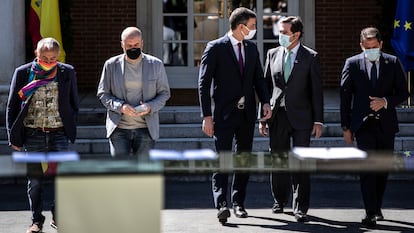Spanish government preparing special unemployment payment that would benefit 550,000 jobseekers
Labor ministry, unions and business associations negotiating a €430 monthly benefit and seeking ways to improve the conditions of the furlough scheme for part-time workers


Spain’s Labor Ministry, unions and business associations are finalizing an extraordinary payment for people who are out of work and have exhausted their unemployment benefits between March 14, when the state of alarm was declared in Spain in a bid to slow the spread of the coronavirus, and September 30. That’s according to a number of sources, who have told EL PAÍS about the ongoing talks.
The possible pact between these different social groups would benefit around 550,000 people who are currently out of work, and would consist of a €430 monthly check that would be paid out during a quarter. The second part of the plan involves an improvement in the way that the amount of unemployment support that is paid to part-time workers who have been furloughed on Spain’s so-called ERTE scheme is calculated. A total of 150,000 people would benefit from this change.
According to the plan, there will be no means-testing requirements for recipients
The new plan is aimed at fixing a shortcoming of the “social shield” that the government announced at the outset of the coronavirus pandemic. Unemployed people who were receiving benefits – which are time-limited in Spain – were unable to seek work due to the restrictions on movement under the state of alarm. Those workers who were furloughed via an ERTE, however, were enjoying an extraordinary payment that did not reduce the rights that they had accumulated while working. The unions brought this argument to the table during negotiations about the ERTE scheme but it was not addressed until the latest extension to the furlough plan.
The decree that extended the ERTE scheme until September 30 included an additional measure that obliged the Labor Ministry to meet with unions and business associations “as soon as possible” to seek “possible solutions” to the exhaustion of benefits by the unemployed during the state of alarm.
“Nearly everything is there,” one negotiator of the plan told EL PAÍS. “We are just waiting to receive the text to see how what we have discussed is finalized.” But until that final document arrives – something that is being delayed in terms of the original timescale that was agreed – no one will be taking for granted that the deal is done.
According to the plan, there will be no means-testing requirements for recipients. Assuming that all of those who are eligible for the benefit request it – some 550,000 workers – the cost will be around €710 million over the quarter.
As for the recalculation of benefits for part-time workers, the amount of money that they missed out on would be paid out in a single payment, according to the draft plan. A total of 150,000 people would benefit from this, according to sources present at the negotiations. Calculating the cost of this measure is a lot more complicated because the payments will depend on the contribution base of each worker and the hours that they worked when employed.
The figures being proposed for the schemes are far from the amounts that have been included in other measures that have been adopted so far to mitigate the effect of the pandemic on the labor market. A total of 3.4 million workers have benefited from the ERTE furlough scheme, at a cost of more than €9 billion between April and July (€3.3 billion in May alone). The extraordinary payment for the self-employed has protected more than 1.4 million people and cost €1.2 billion a month.
Assuming that all of those who are eligible for the benefit request it, the cost of the monthly payment will be around €710 million over the quarter
Once the text of this latest plan has been finalized, it will have to be approved by the Finance Ministry, which has made it known that it is up to speed with the negotiations and that a pact is on its way. However, ministry sources have stressed that the moment has not yet arrived for the department to begin participating.
Negotiators from the CCOO and UGT unions reported that there have been no discrepancies with the CEOE and Cepyme business associations on the issue, adding that the latter supported the measure. However, during these kind of conversations it is normal for the sector to maintain a lower profile
That said, the measures are consistent with what the business associations have been calling for since the start of the pandemic. The CEOE has been advocating massive subsidies to support companies in order to maintain employment and income this year. The new exceptional benefits fit within the argument that this would be an extraordinary cost that would not become a structural one.
This measure would be a further step in what the government called its “social shield.” Apart from the government’s new guaranteed minimum income scheme, which was planned before the pandemic took hold to assist vulnerable households but expedited in the wake of the health crisis, the measures that have been taken so far have been focused on those who have been directly affected by the pandemic: those who have been furloughed on the ERTE scheme, the workers who have lost their jobs over these past months and the self-employed who have been forced to suspend their activity and as a result have been left without income. This new planned benefit would serve to protect the indirect victims of the Covid-19 crisis.
English version by Simon Hunter.
Tu suscripción se está usando en otro dispositivo
¿Quieres añadir otro usuario a tu suscripción?
Si continúas leyendo en este dispositivo, no se podrá leer en el otro.
FlechaTu suscripción se está usando en otro dispositivo y solo puedes acceder a EL PAÍS desde un dispositivo a la vez.
Si quieres compartir tu cuenta, cambia tu suscripción a la modalidad Premium, así podrás añadir otro usuario. Cada uno accederá con su propia cuenta de email, lo que os permitirá personalizar vuestra experiencia en EL PAÍS.
¿Tienes una suscripción de empresa? Accede aquí para contratar más cuentas.
En el caso de no saber quién está usando tu cuenta, te recomendamos cambiar tu contraseña aquí.
Si decides continuar compartiendo tu cuenta, este mensaje se mostrará en tu dispositivo y en el de la otra persona que está usando tu cuenta de forma indefinida, afectando a tu experiencia de lectura. Puedes consultar aquí los términos y condiciones de la suscripción digital.








































